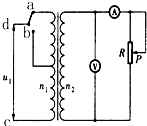问题
不定项选择
在“探究弹性势能的表达式”的活动中,为计算弹簧弹力所做的功,把拉伸弹簧的过程分为很多小段,拉力在每小段可以认为是恒力,用各小段做功的代数和代表弹力在整个过程所做的功,物理学中把这种研究方法叫做“微元法”。下面几个实例中应用到这一思想方法的是 [ ]
A.由加速度的定义 ,当
,当 非常小,
非常小, 就可以表示物体在t时刻的瞬时加速度
就可以表示物体在t时刻的瞬时加速度
B.在探究加速度、力和质量三者之间关系时,先保持质量不变研究加速度与力的关系,再保持力不变研究加速度与质量的关系
C.在推导匀变速直线运动位移公式时,把整个运动过程划分成很多小段,每一小段近似看作匀速直线运动,然后把各小段的位移相加
D.在不需要考虑物体本身的大小和形状时,用有质量的点来代替物体,即质点
答案
AC

 sin
sin V
V